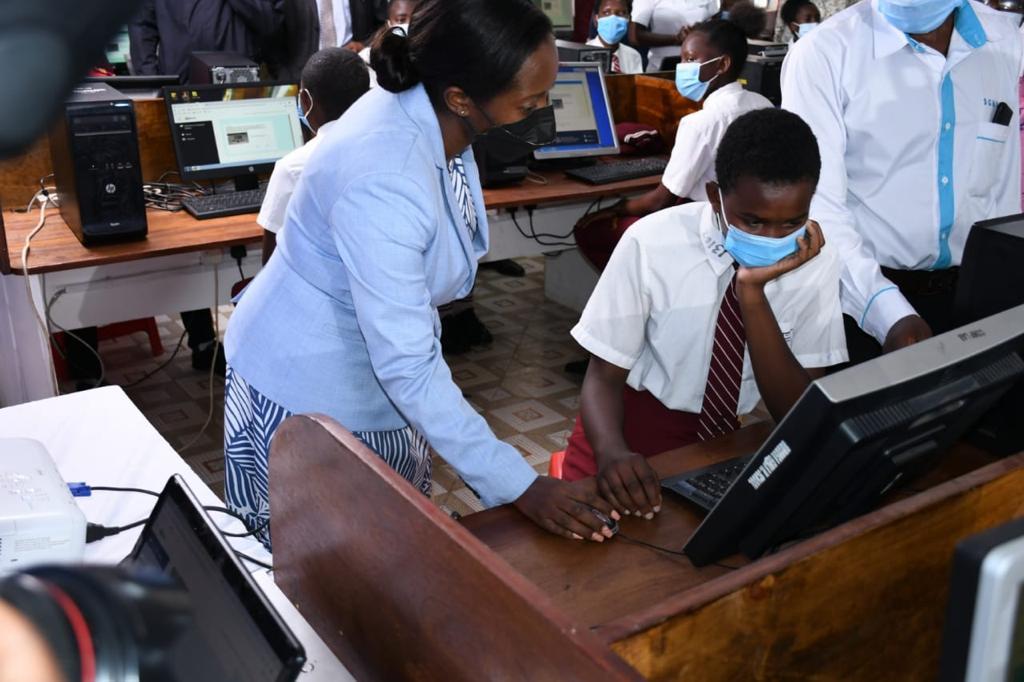ICTA to Boost Learners Innovation Skills

The launch of SchoolNet project - a programme implemented ICT Authority (ICTA) in both primary and secondary on behalf of the Government is geared to immensely boost learners’ digital and innovation skills, Maureen Mbaka, Chief Administrative Secretary, Ministry of ICT, Innovation and Youth Affairs has said.
Asserting that Internet connectivity offers learners unlimited opportunities to access and source for authentic knowledge while in and out of a regular classroom session, Ms Mbaka observed how in recent times, the outbreak of Covid-19 abruptly halted classroom teaching and a sizable surge was seen in the use of virtual coaching, video conferencing tools, and use of online learning applications.Â
Schools according to Ms Mbaka scurried to provide learning through the aid of digital platforms, amidst the rollercoaster ride of the pandemic, a situation that has since clearly depicted that online education was here to stay, and there was a need to create a strong infrastructure in its favour.Â
In a similar launch in Mandera County presided by Idris Aden Ibrahim, Senior Executive Officer at KNUT Headquarters flanked by Edward Mogusu the Assistant County Commissioner Takaba and Mohamed Tullo Ali the TSC Subcounty Director at Takaba, the need for internet connectivity to schools was echoed. The two beneficiaries of the piloted SchoolNet project within the county were Haji Yussuf Girls Secondary School and Takaba Primary School.
“The ICT Authority is implementing critical ICT programmes for the country, among them being the Digital Literacy Programme (DLP) which was borne out of the governments’ vision to make sure every pupil is prepared for today’s digital world and transforming Kenya into a 21st Century knowledge economy,†said Dr. Kipronoh Ronoh, Ag. Chief Executive Officer (CEO) ICT Authority.
According to Dr. Ronoh, the Digital Literacy Programme has substantially been completed with Phase I covering 22,891 public primary schools, which so far has had 1,168,905 digital learning devices delivered to schools and installed with digital content for pupils in Grade one, two ans three.Â
She noted that learners equally needed digital skills to enable them manoeuvre through virtually taught classes, including doing class assignments and taking Continuous Assessment Tests (CATS) when schools were closed at the outbreak of Covid -19 pandemic..
“The indefinite closure of schools for over eight (8) months in the wake of Covid-19 pandemic never interrupted learning and syllabus coverage for schools which had invested in technology infrastructure and connectivity however, caught most public schools off-gourd because they were unprepared for this unprecedented turn of events,†she said.
According to the CAS, it is very crucial to prepare the young generation for the digital world ahead of them, for easy transition from being students to workers.Â
“Digitization will definitely affect how people will work, access services, create business linkages and networks, market their innovations and creative skills to make decent livelihoods, all in an effort to create an all-inclusive digital economy,†she noted.
She also confirmed that government has put in place various laws and regulations pertaining to use of digital spaces, some of which include data protection laws, cyber security laws, computer misuse and cybercrime laws, child online protection laws, which enables prosecutors expedite cybercrimes matters in court for justice to be served in record time
The CAS was speaking when launching the ‘schoolnet connectivity’ programme in Sironga Girls Secondary and Primary Schools in Nyamira County in the company of ICTA deputy Director Philip Irode who assured that the devices are protected from accessing unsafe content, before learners are allowed to use them to access the internet.Â
He said the safety is ensured by installing firewall devices that ensure the content accessed is safe from internet hostilities such as cybercrime and cyber bullying.
“Digital skills are important to learners because they are exposed to digital spaces early and gives them full opportunity to explore their innovative and creative skills, courtesy of technology, the reason why internet connectivity to schools is fast becoming a basic requirement for any school to operate efficiently,†Phillip Irode, Deputy Director, Information Security, ICT Authority.
Jael Moraa, a student at Sironga Girls High School, taking computer studies as one of her subjects, acknowledged that internet has exposed her to a huge library of academic reading materials, just at the click of a button, which could take her several days to access or at worst not access such information at all because physical books have their limitations.
 “Access to unrestricted free internet is likely to entice many young learners to drift to unsafe online social sites, which will slowly but surely drift them off their main focus of concentrating on their academic studies, I, therefore, appeal for high self-discipline and self-regulation because after we all need the excellent grades to enable us pursue future dream careers,†she advised fellow students.
Sironga Girls Secondary School, Chief Principal, Eva Odhiambo, was very grateful to the government and other partners for considering their school for the pilot phase of the ‘schoolnet connectivity’ initiative and promised that the school administration will do their best in digitally equipping the girls, to ensure they remain relevant in the digital world, even after clearing studies at the school.
Â
Â